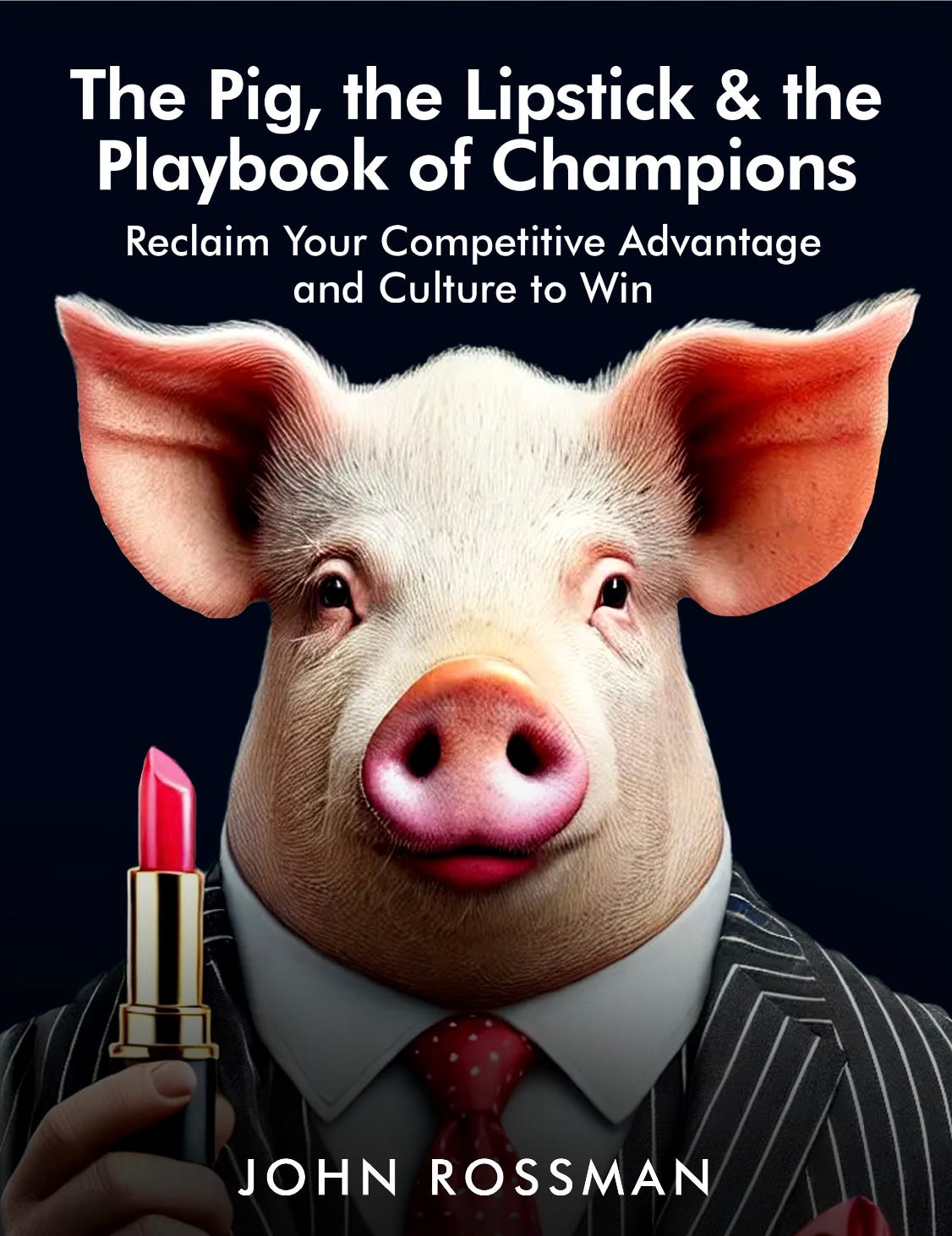Prepare for Winning in 2025 -- The Pig, the Lipstick, and the Playbook of Champions
They lose the ability to be on offense. And the worst thing that a company can do, like a sports team, is start playing defense because you're afraid to fail. That is a disease. Not unlike another disease which has happened in Starbucks, which is hubris.
— Howard Schultz, 2024 on Starbucks
Imagine this: You walk into the boardroom of your company—polished, buttoned up, PowerPoints ready to handout with a compelling vision and plan. You’re ready to discuss "strategy” or “growth plan.”
The words roll off your tongue like a preacher selling salvation — Growth, Innovation, Customer Experience, Digital Transformation. Give me an “AMEN!”
Yet underneath the veneer of buzzwords and enthusiasm, you sense the real problem: mediocrity has not only crept into the organization, it’s now the defacto target for what is accepted. Mediocre customer experience. Mediocre ambitions. Mediocre execution. Mediocre accountability.
I call it “putting lipstick on the pig.” It’s when leaders of businesses, instead of addressing the truth, dress up this year’s plan with shiny initiatives which don’t address reality — we have an undifferentiated product or service, and a culture which accepts and perpetuates mediocrity.
Organizations that thrive and maintain competitive advantage do so by confronting uncomfortable truths and attacking them head-on—not by sprucing them up with a fresh coat of paint. It’s time to rip the lipstick off and face the pig for what it is.
Download this business manifesto for FREE
Mediocrity Is the Enemy
The greatest danger to any organization is not external competition or disruptive technologies. It’s a combination of incrementalism, short-terism and a culture accepting mediocrity. It’s the slow, insidious erosion of ambition, accountability, and urgency. Mediocrity whispers, “Good enough is okay.” It rationalizes average performance, tolerates subpar results, and smothers innovation under a wet blanket of bureaucracy and excuses.
And let me be blunt: the acceptance of mediocrity isn’t the employees’ fault—it’s our acceptance and contribution to accepting it. Leaders who avoid making tough decisions, who prioritize consensus over sharp thinking and results, and who hide behind empty-calorie words are complicit in letting this happen.
If this makes you uncomfortable, good. Growth begins at the edge of discomfort.
Growth begins at the edge of discomfort
The Tragic Tale of Competitive Advantage
The history of sustained business advantage is mostly a tale of failure. Think Kodak, Blockbuster, Xerox. These were companies with market dominance, strong brands, and resources galore.
But don’t look that far back. Look at Intel, Nike, Starbucks, Ford and Boeing. They have come off their leadership position because they mistook their success as a shield against change. They applied lipstick to their legacy business models, assuming their past would protect their future.
Ford's Existential Risk: Don't Wait. Act As If
By failing to prepare, you are preparing to fail. - Benjamin Franklin
Stop Playing Defense
There’s a disease in business leadership I call “playing defense.” Leaders get comfortable, protecting what they’ve built instead of pushing for what’s next. They chase quarterly results, patch problems, and avoid big bets. They focus on not losing, rather than on winning. And in doing so, they unwittingly lose everything.
Howard Schultz, the legendary leader of Starbucks, once reflected on his company’s decline: "The worst thing a company can do is start playing defense because you're afraid to fail. That is a disease."
Amen. Playing defense is not a strategy—it’s lazy and selfish. If your organization isn’t relentlessly pursuing excellence and innovation, you’re not standing still; you’re sliding backward.
"It Nevers Ends Well" -- Howard Schultz on Starbucks and The Innovators Dilemma
Strategies and Techniques for Change Agents, Strategists, and Innovators
The Playbook of Champions: A Better Way
So how do we break free? How do we stop merely surviving and start thriving? Enter the Playbook of Champions. This isn’t a shiny object or a buzzword-laden framework. It’s a relentless, systematic approach to leadership, culture, and innovation designed to deliver sustainable excellence.
At its core, the Playbook focuses on three interconnected pillars: Building the Foundation, Chasing Perfection, and Taking Big Bets. Let me break it down.
Build the Foundation
Great organizations don’t rely on strategy alone. They align Purpose, Principles, and People to create a foundation where high standards are the norm—not the exception.
Start by defining your Massively Transformative Purpose (MTP). This isn’t your mission statement or a fluffy set of values on your website. It’s a bold declaration of what your organization stands for and what it’s relentlessly working toward.
Pair it with leadership principles that aren’t just written down but are embedded in your daily operations, decision-making, and expectations.
And then comes the team. Structure comes before talent. If your team isn’t aligned strategically, role clarity and accountability won’t exist. Build your organization with intention, then hire and train people who thrive in a culture of excellence.
Chase Perfection
Chasing Perfection doesn’t mean everything has to be flawless. It means identifying the right details—the ones that truly matter—and obsessing over them. Operational excellence isn’t achieved by chance; it’s built through humility, rigorous metrics, and designing and applying technology for the machine which builds the machine.
Take a hard look at your key performance indicators (KPIs). Are they driving the behavior and results you want? Take a humble look at where your business is at — not where it used to be. Develop metrics which tell you the truth and give you actionable insights for improvement.
Design “the machine that makes the machine” — your processes, technology and AI applications which deliver great customer experiences with high efficiency and quality. That’s the machine we need to win.
Take Big Bets
If you’re not making bold moves, you’re not building the next great business for your current business. Big bets are about doing more than tweaking the edges of your business. They’re about exploring transformative initiatives—new business models, disruptive technologies, high-potential innovations.
Big bets aren’t blind gambles. In fact, they aren’t “big” until the critical risks are tested. They’re calculated risks driven by clarity, speed, and focus. Leaders like Elon Musk, Satya Nadella, and Jeff Bezos succeed because they prioritize what matters most, act decisively, and pivot when necessary. They don’t bet the farm, but they don’t cling to it either.
The Lipstick Test: Are You Ready?
Here’s a challenge for you: Take a hard look at your business and your leadership. Are you applying lipstick to the pig? Are you tolerating slowing growth, average margins, typical customer satisfaction, playing it safe, and incrementalism?
The Playbook of Champions isn’t for everyone. It’s for leaders and organizations willing to embrace discomfort, challenge the status quo, and commit to a path of relentless improvement. It’s for those ready to trade short-term comfort for long-term success.
If you’re up for it, you’ll need a framework. The approach to question your own assumptions. The techniques to set bold goals and hold yourself and your team accountable. And the vision to lead your organization out of the quagmire of mediocrity and into a future defined by excellence.
No more lipstick. No more excuses. It’s time to reclaim your competitive edge and build a championship team.
Have your team read this business manifesto while doing next year’s business planning and goal setting.
The Pig, the Lipstick and the Playbook of Champions: Reclaim Your Competitive Advantage and Culture is my business manifesto, and it’s free. Please share.
Please share this post with your team.
Onward!
John
About The Digital Leader Newsletter
This is a newsletter for change agents, strategists, and innovators. The Digital Leader Newsletter is a weekly coaching session focusing on customer-centricity, innovation, and strategy. We deliver practical theory, examples, tools, and techniques to help you build better strategies, better plans, and better solutions — but most of all, to think and communicate better.
John Rossman is a keynote speaker and advisor on leadership and innovation. Learn more at www.johnrossman.com.






